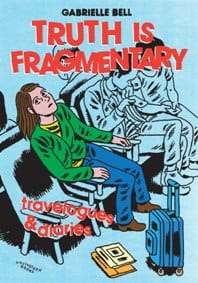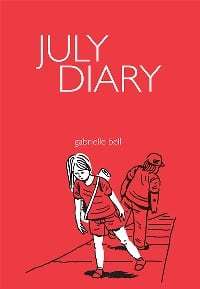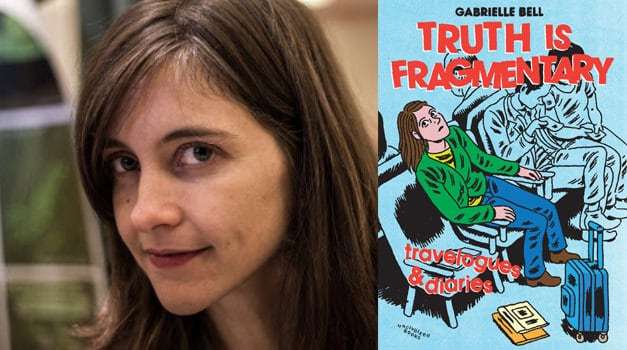Truth Is Fragmentary by Gabrielle Bell
Sometimes, we look, but we don’t see. It takes a patient, trenchant observer to map out the seemingly insignificant moments of everyday life in a way that resonates, that feels true. With her delicate, unmistakable line and her sharp wit, Gabrielle Bell is one of the most compelling cartoonists around. In her autobiographical comics, she reflects the world around her with an intense and steady gaze. Her most recent book, Truth Is Fragmentary (Uncivilized Books, 2014), is a collection of diary comics that have been shaped and edited for publication. The storylines that unfold in carefully boxed-in panels often veer in unexpected directions — from tangential thought patterns about everyday life to fantasies of talking bears. Bell shows life as it happens: messy and unexpected, filled with anxiety, fascination, and joy. The most peripheral thoughts and interactions become central as Bell disciplines us in the art of careful observation.
Some of the comics collected in Bell’s recently published Truth Is Fragmentary were first drawn for an annual diary-making project that Bell sometimes imposes on herself. For the full month of July, she creates one diary comic a day. On a recent Thursday, I sat down with Bell in Greenpoint, Brooklyn to discuss diaries, fiction, and the pull of autobiography.
 BOOKTRIB: How long have you been keeping diary comics?
BOOKTRIB: How long have you been keeping diary comics?
GABRIELLE BELL: Off and on since my mid-20s. The first thing I published, as far as diaries go, was Lucky. Before that, I was keeping a personal comics diary, which I could never publish because it was too personal and boring. But I was spending so much time doing that, I thought I would try to put it to some use by making it public. So I changed my intention. I said, I’m just going to do a diary comic every day, but for the public. It’s going to be published.
BT: Where did you get the concept of the July diary, and what’s its purpose?
GB: I was doing Bikrim Yoga, and there’s this thing they do called the 30-day challenge. The idea of it is to challenge yourself, to force yourself out of your comfort zone. I wanted to try to do that with comics, not yoga.
I did it to motivate myself. There’s also something about it that forces me to pay attention to everything around me. I like that feeling of being in the moment, here and now, and then having to account for it. I live my life and then the next day I have to do homework.
 BT: Is the process of creating diary comics different from when you create fictional comics?
BT: Is the process of creating diary comics different from when you create fictional comics?
GB: There’s more distance from life with non-diary comics. I like to do short stories; I get bogged down in them, and the process becomes separate from my regular life. It’s a neurotic thing, but there’s something about the diary comic that makes me feel like it’s integrated into my life. There’s a relationship there between my life and my work.
BT: What do you think happens when you call something a diary? What’s the difference between creating a diary and a long-form memoir?
GB: I don’t understand memoir at all because my memory is so bad. Sometimes I’ll be going through an interesting or difficult time in my life and I’ll tell myself, “Someday I’ll write a memoir about this.” But I don’t remember very well at all. I’m too busy during those times to keep a diary, and I feel like I’ve lost most of the experience a month later. I don’t understand how people have these very detailed, structured memoirs. With diary, I feel like I’m working on memoir in the present time, even though not much has happened.
BT: Do you read other people’s diaries?
GB: I read diary comics and autobiographical comics online, and they’re very inspiring: Vanessa Davis and Julia Wertz and Gabby Schulz. I’m drawn to these sincere diarists that are naked and open about their despair. I prefer that to somebody who has a punch-line.
BT: What projects are next for you, in addition to the upcoming July diary?
GB: I’m working on some short stories. I initially made a New Year’s resolution not to do any more autobiography; it embarrasses me. But now I miss doing autobiography, and I think it might be integral to my process.
What we experience seems like the only true thing. A fictional story can ring true but if it doesn’t ring true it rings very false. I think it’s harder to be false in autobiography. I like the malleability of it.





